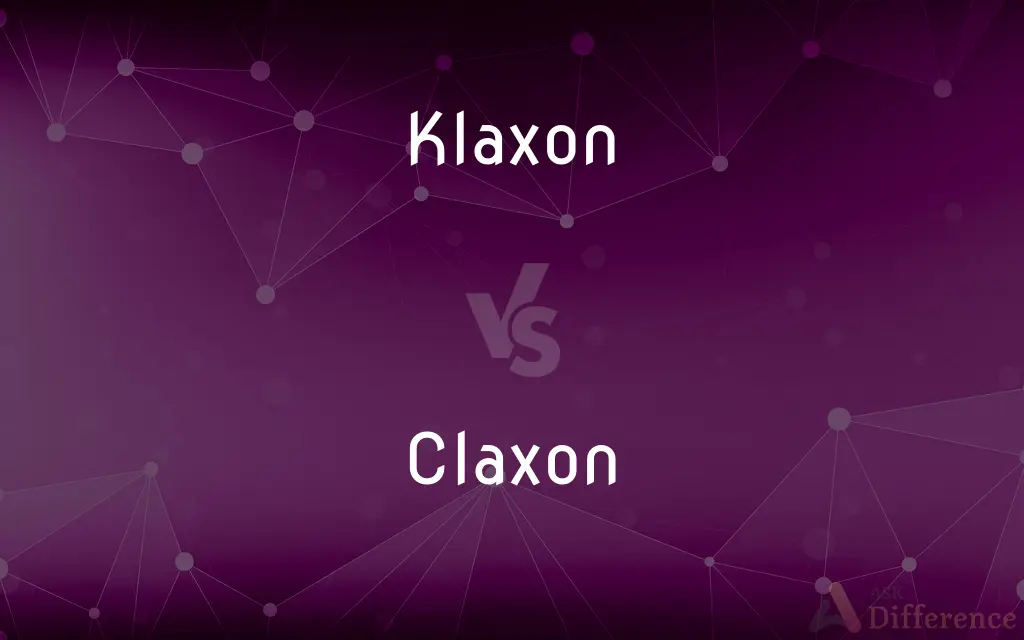Klaxon vs. Claxon — What's the Difference?
By Tayyaba Rehman & Urooj Arif — Updated on March 25, 2024
Klaxon is a trademarked name for a type of electric horn, while Claxon is a common misspelling or variant spelling of Klaxon, often used interchangeably in informal contexts.

Difference Between Klaxon and Claxon
Table of Contents
ADVERTISEMENT
Key Differences
Klaxon refers to a specific brand of electric horn that produces a loud, distinctive sound, originally designed for use in automobiles and other vehicles. This term has become synonymous with the type of sound produced by these horns, characterized by its loud, attention-grabbing nature. On the other hand, Claxon is often considered a common misspelling or a variant spelling of Klaxon, though it is used interchangeably in some regions and contexts. Despite the difference in spelling, when people refer to Claxon, they typically mean the same type of electric horn or sound associated with Klaxon.
The original Klaxon horns were patented in the early 20th century and have since become iconic for their use in various applications, including cars, ships, and emergency vehicles. Their distinctive "ahooga" sound is recognized worldwide. Whereas, the term Claxon, despite its status as a variant or misspelling, is sometimes used in literature, conversation, and even product descriptions, though it lacks the brand-specific connotation of Klaxon.
In terms of usage, Klaxon is more commonly found in formal writing and documentation, especially when referring to the branded product or specifying the type of horn sound. Claxon, however, is more likely to appear in informal contexts or in regions where the spelling has become normalized through common usage. The distinction is important for clarity in communication, particularly in technical or commercial contexts where specificity about the product is necessary.
Klaxon has also extended beyond its initial association with horns, being used metaphorically to denote any loud warning signal or alert, reflecting its cultural impact as a symbol of urgent notification. Claxon, while less commonly used in this metaphorical sense, may be recognized in similar contexts due to its association with the sound of Klaxon horns. This demonstrates how brand names can evolve into generic terms reflecting a broader concept or function.
Despite these differences, the primary function of both Klaxon and Claxon remains the production of a loud, distinctive sound intended to alert or warn. Whether used to describe the sound itself or the device producing it, the essence of both terms is rooted in their ability to capture attention and convey urgency, underscoring the minimal practical difference in their application.
ADVERTISEMENT
Comparison Chart
Definition
A brand name for a specific type of electric horn.
Often a misspelling or variant spelling of Klaxon, used interchangeably.
Origin
Trademarked name, patented in the early 20th century.
Variant or informal adaptation of Klaxon.
Usage
More formal, especially in technical contexts.
More informal or in regions where the variant spelling is accepted.
Sound
Characterized by a loud, distinctive "ahooga" sound.
Implies the same type of sound as Klaxon.
Metaphorical Use
Used to denote any loud warning signal or alert.
Less commonly used metaphorically but understood in similar contexts.
Association
Strongly associated with the brand and its products.
Lacks brand-specific connotation, used more generally.
Function
To produce a loud, attention-grabbing sound for alerts or warnings.
Same as Klaxon, indicating its function rather than brand specificity.
Compare with Definitions
Klaxon
Trademarked and associated with quality and specific sound.
Vintage automobiles often feature the original Klaxon horns for authenticity.
Claxon
Implies a loud, warning sound similar to Klaxon.
The loud Claxon of the ship warned of the impending departure.
Klaxon
Produces a distinctive "ahooga" alert sound.
The Klaxon's sound is designed to be immediately recognizable as a warning.
Claxon
Seen as an informal variant or common misspelling.
Some manufacturers label their horns as Claxon due to the common usage.
Klaxon
Symbolizes urgent alerts beyond automotive use.
The term Klaxon has become synonymous with any form of loud alert.
Claxon
Appears in informal writing or where the variant spelling is normalized.
Local regulations require all buses to have a working Claxon for safety.
Klaxon
Preferred in formal contexts or when specifying brand.
Emergency vehicles are equipped with Klaxon horns to signal urgency.
Claxon
Less about brand, more about the sound or function.
In emergency drills, the Claxon signals the start of the evacuation.
Klaxon
A specific brand of electric horn known for its loud sound.
The car's Klaxon blared loudly, alerting everyone to move out of the way.
Claxon
Often a misspelling or variant of Klaxon, referring to a loud horn.
The truck sounded its Claxon as it approached the busy intersection.
Klaxon
An electric horn or warning hooter
The tug blew its klaxon three times
Claxon
Alternative spelling of klaxon.
Klaxon
A loud electric alarm or horn.
Claxon
A kind of loud horn formerly used on motor vehicles.
Klaxon
(intransitive) To produce a loud, siren-like wail.
Claxon
To sound loudly; - of car horns.
Klaxon
A kind of loud horn formerly used on motor vehicles.
Claxon
To use the horn of a car.
Klaxon
A kind of loud horn formerly used on motor vehicles
Claxon
A kind of loud horn formerly used on motor vehicles
Claxon
Make a loud noise;
The horns of the taxis blared
Claxon
Use the horn of a car
Common Curiosities
What is a Klaxon?
A Klaxon is a brand name for a specific type of electric horn known for its loud and distinctive sound, often used in vehicles and emergency alerts.
Can Claxon be used formally?
While Claxon can be understood in formal contexts, Klaxon is preferred for technical accuracy and brand specificity.
Why do some people use Claxon instead of Klaxon?
Some use Claxon due to regional spelling variations, informal habits, or unawareness of the correct spelling as Klaxon.
Can the term Klaxon be used metaphorically?
Yes, Klaxon is also used metaphorically to denote any form of loud warning or alert, reflecting its widespread recognition.
What should I consider when buying a Klaxon horn?
Consider the application, whether for a vehicle, safety system, or other use, ensuring it meets the necessary sound level and tone requirements.
Are Klaxon horns only used in automobiles?
No, Klaxon horns are used in various applications, including ships, emergency vehicles, and as general warning signals.
How does Claxon differ from Klaxon?
Claxon is often a misspelling or variant spelling of Klaxon, used interchangeably but less formally and without the brand-specific association.
Is there a difference in sound between Klaxon and Claxon?
No, both terms imply the same type of loud, distinctive sound, although Klaxon is directly associated with the trademarked horn's sound.
How has Klaxon influenced cultural references?
The distinctive sound of Klaxon horns has made them a common reference in media and literature for signaling alerts or emergencies.
Is Claxon recognized as a legitimate term?
While Claxon is widely understood, it is not the official brand name and is seen as a less formal variant or misspelling of Klaxon.
Share Your Discovery

Previous Comparison
Projection vs. Displacement
Next Comparison
Aerospace vs. AviationAuthor Spotlight
Written by
Tayyaba RehmanTayyaba Rehman is a distinguished writer, currently serving as a primary contributor to askdifference.com. As a researcher in semantics and etymology, Tayyaba's passion for the complexity of languages and their distinctions has found a perfect home on the platform. Tayyaba delves into the intricacies of language, distinguishing between commonly confused words and phrases, thereby providing clarity for readers worldwide.
Co-written by
Urooj ArifUrooj is a skilled content writer at Ask Difference, known for her exceptional ability to simplify complex topics into engaging and informative content. With a passion for research and a flair for clear, concise writing, she consistently delivers articles that resonate with our diverse audience.
















































